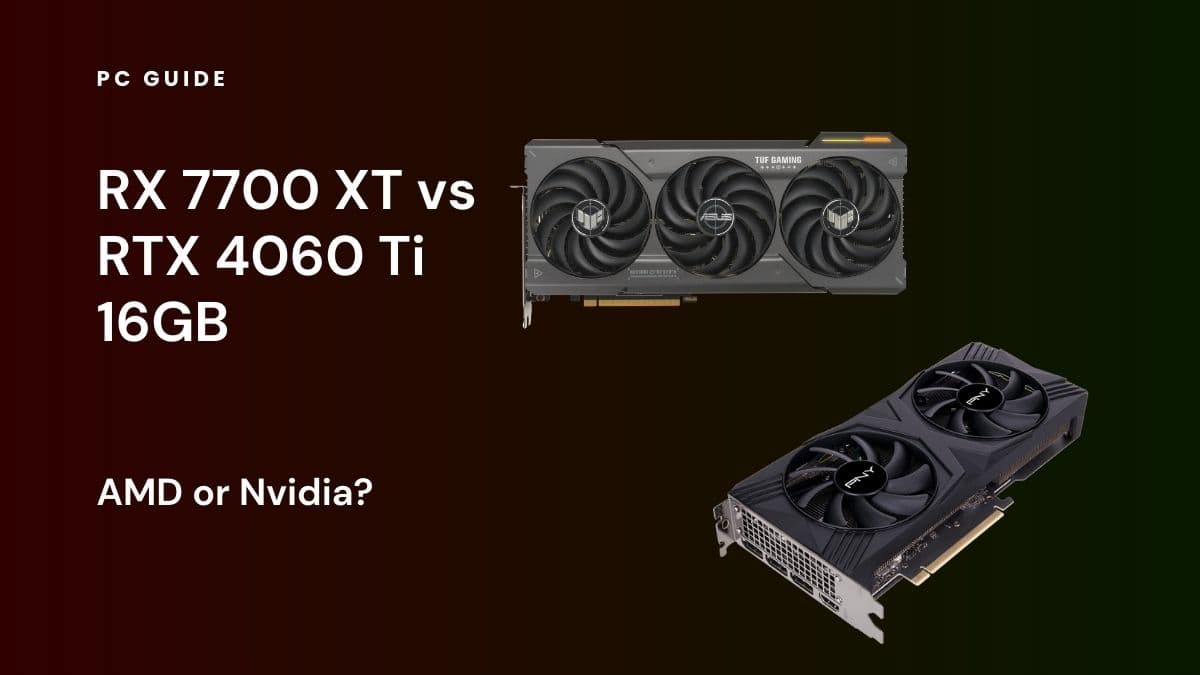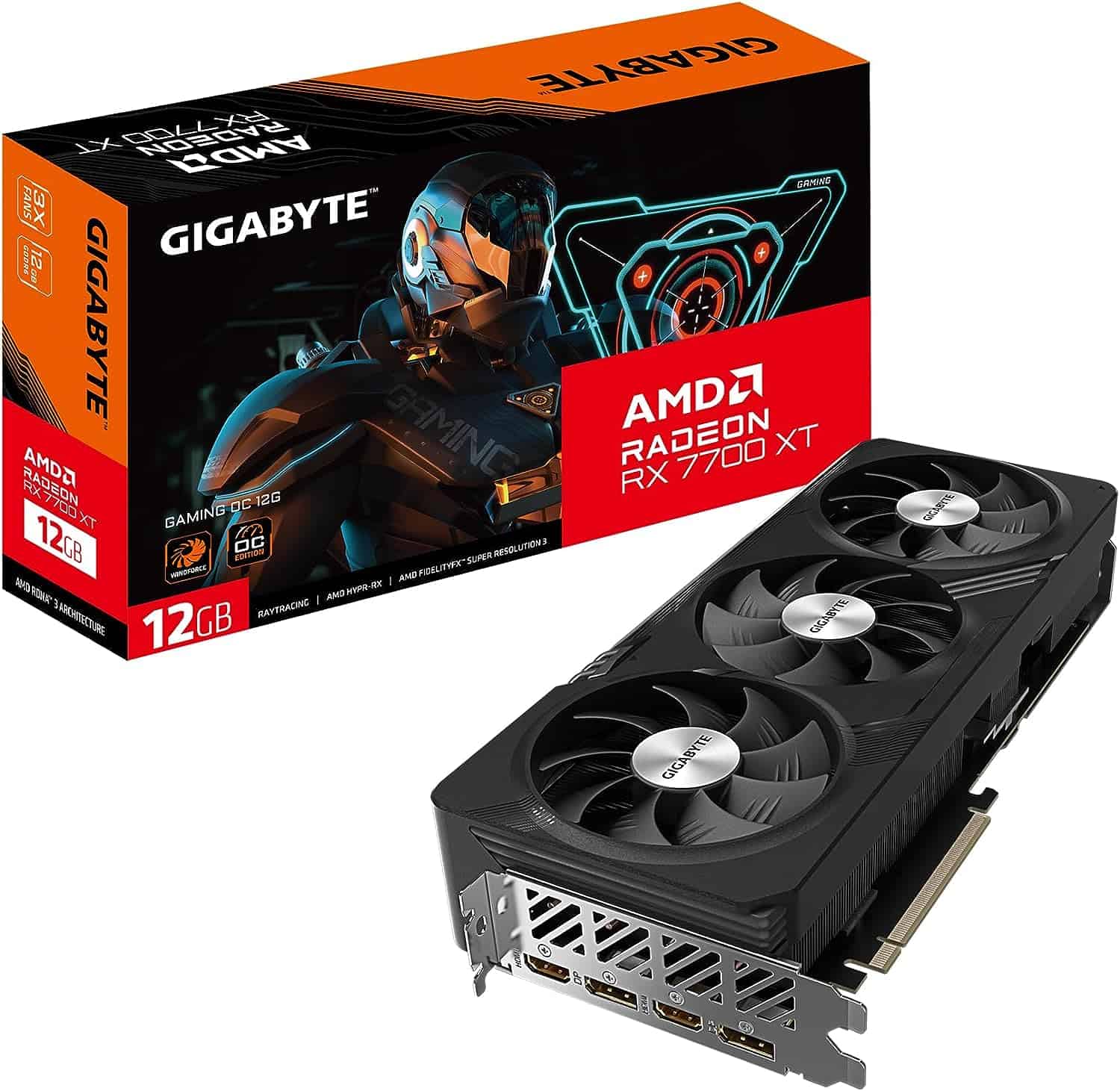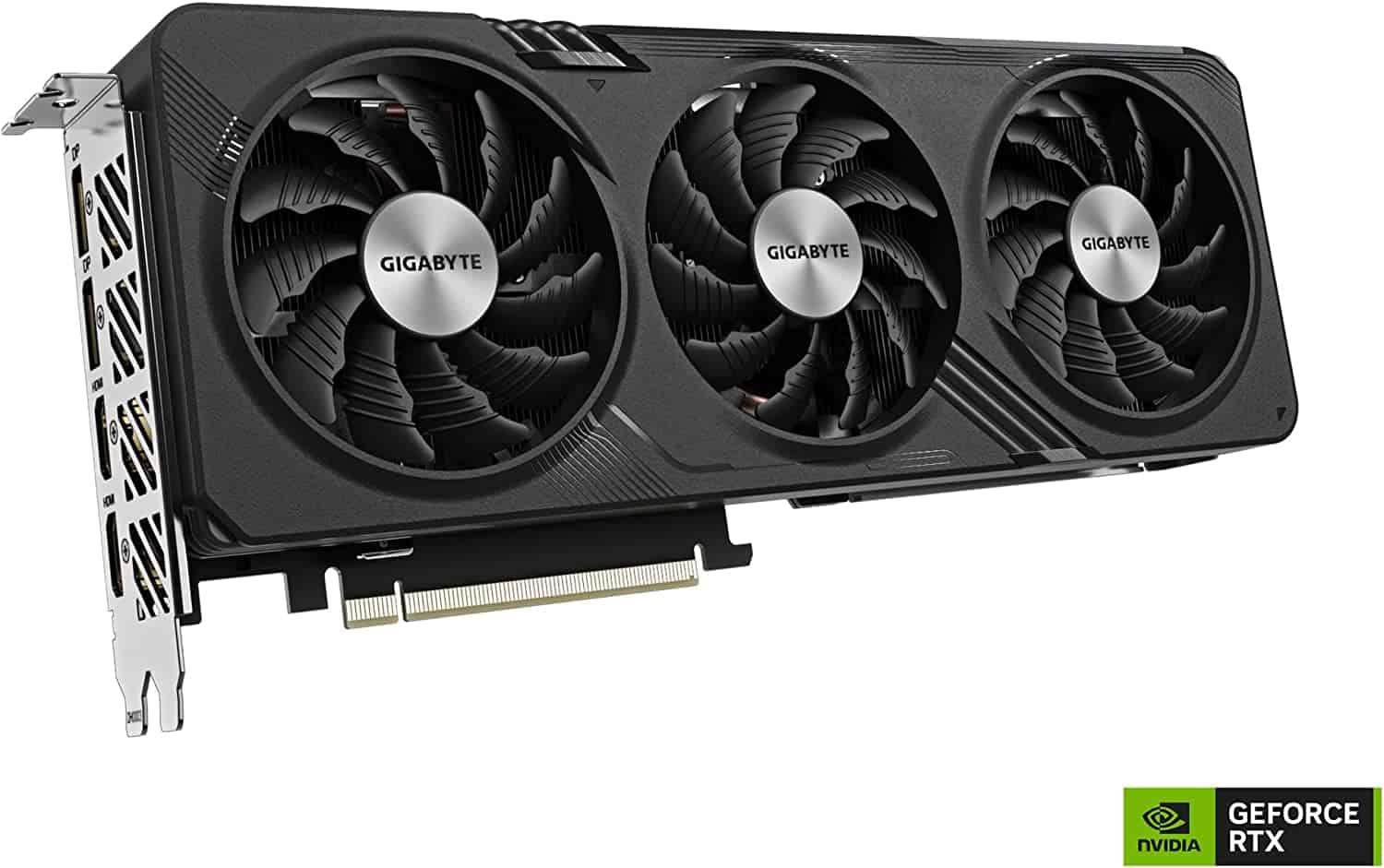RX 7700 XT vs RTX 4060 Ti 16GB – AMD or Nvidia?

Table of Contents
In the face-off between the AMD Radeon RX 7700 XT vs RTX 4060 Ti 16GB, we are diving deep into the capabilities of two of the most anticipated graphics cards on the market. The Nvidia RTX 4060 Ti 16 GB version emerged as the saving grace of its series after a couple of less-impressive predecessors – but with a new AMD RDNA 3 launch, there’s competition.
As AMD unveils its RX 7700 XT – due September 6 alongside the 7800 XT as it fills out its XT graphics cards lineup – questions arise about its potency against Nvidia’s powerhouse. This comparison of the RX 7700 XT vs RTX 4060 Ti 16GB aims to settle the debate and highlight the strengths and weaknesses of each contender. We go into even more detail in our RTX 4060 Ti review.
RX 7700 XT vs RTX 4060 Ti 16GB: Specifications
When diving into the specifics, the Nvidia Geforce RTX 4060 Ti 16GB stands out primarily due to its robust 16GB GDDR6 VRAM. This is an undeniable advantage when considering high-end gaming and graphic-intensive applications, offering a memory cushion that can handle larger textures and more detailed game worlds.
However, the RX 7700 XT, while featuring a slightly smaller 12 GB GDDR6 VRAM (the RX 7800 XT features 16GB) is by no means underpowered. In fact, for its range, 12GB is commendably adequate and should sufficiently support most modern games and tasks.
| Specifications | RX 7700 XT | RTX 4060 16GB |
|---|---|---|
| Architecture | Navi 32 | AD106 |
| RT Accelerator | 54 | 32 |
| Cores | 3456 | 4352 |
| VRAM | 12 GB GDDR6 | 16 GB GDDR6 |
| Memory Interface Width | 192-bit bus | 128-bit bus |
| Memory bandwidth | 432.0 GB/s | 288.0 GB/s |
| Process Technology | TSMC 5nm | TSMC 5nm |
| Base clock speed | 2171 MHz | 2310 MHz |
| Boost Clock speed | 2544 MHz | 2535 MHz |
| Graphics Card Power (TDP) | 245W | 165 W |
| L3 cache | 48 MB | 0 |
| MSRP | $449 | $499 |
Now, moving beyond memory, the RX 7700 XT showcases superior muscle in various areas. It outperforms the 4060 Ti in RT accelerator count, boasting 54 against Nvidia’s 32, suggesting a more enhanced ray tracing capability. Moreover, the AMD card has a wider memory interface at 192-bit, leading to an impressive memory bandwidth of 432.0 GB/s, significantly surpassing the 4060 Ti’s 288.0 GB/s.
This higher bandwidth means quicker data transfer and generally smoother performance in demanding situations. Add to that the unique L3 cache on the RX 7700 XT, which aids in faster response times, and it’s clear that AMD has invested in delivering a holistically stronger card.
RX 7700 XT vs RTX 4060 Ti 16GB: Performance
At the outset, it’s essential to approach manufacturer-led benchmarks with a hint of skepticism. They’re inherently geared towards highlighting the best aspects of the product in question. That being said, based on the benchmark results provided by AMD, the RX 7700 XT consistently outperforms the RTX 4060 Ti 16GB in a majority of tested games. On average, across the ten games where the RX 7700 XT led, it performed approximately 21% better than its Nvidia counterpart.
Such a percentage difference, especially in graphically intensive titles like CyberPunk 2077 and Red Dead Redemption 2, can mean smoother gameplay, sharper visuals, and generally a more immersive gaming experience. In titles such as F1 2023 and Doom Eternal, the card seemingly lagged behind the RTX 4060 Ti 16GB by 5% and 9% respectively. These variations indicate that while AMD’s card might excel in most situations, there are scenarios where Nvidia’s GPU may take the lead.
It’s worth noting that such inconsistencies in performance can be attributed to a myriad of factors, including game optimization for specific architectures, driver maturity, and specific game engines’ affinity towards one brand over the other. Ultimately though, these results should suggest potential performance rather than be taken as guaranteed results. Do check across third-party performance results before you decide to buy an RX 7700 XT.
RX 7700 XT vs RTX 4060 Ti 16GB: Price
Historically, AMD has managed to undercut Nvidia in terms of pricing, often offering comparable or superior performance for fewer dollars. In the battle between the RX 7700 XT and the RTX 4060 Ti 16GB, this trend remains intact.
AMD’s RX 7700 XT is priced at $449, which is $50 less than Nvidia’s offering at $499. What makes this price difference even more intriguing is that the RX 7700 XT is not just more affordable but, as indicated by the benchmarks, potentially a stronger performer in many scenarios. Thus, in terms of sheer value for money, AMD appears to have the upper hand.
Camilo’s final thoughts
The face-off between the RX 7700 XT and the RTX 4060 Ti 16GB is emblematic of the intense competition between AMD and Nvidia, two giants of the graphics card industry. Based on the data at hand, the RX 7700 XT emerges as the winner, both in terms of price and performance. However, Nvidia’s long-standing strengths, including their RT 3 and DLSS technologies, should not be discounted.
They can significantly boost performance and visuals in supported titles, providing the 4060 Ti 16GB with some firepower against its AMD counterpart. Nevertheless, as of this comparison, the RX 7700 XT stands out as a more compelling choice, particularly for those seeking the best value. Still, potential buyers should always consider their specific needs and preferences. As the tech landscape evolves, one thing is certain: gamers and enthusiasts will benefit from this spirited competition. Looking for more detail? Read our sister-site, WePC’s) Radeon RX 7700 XT review.


